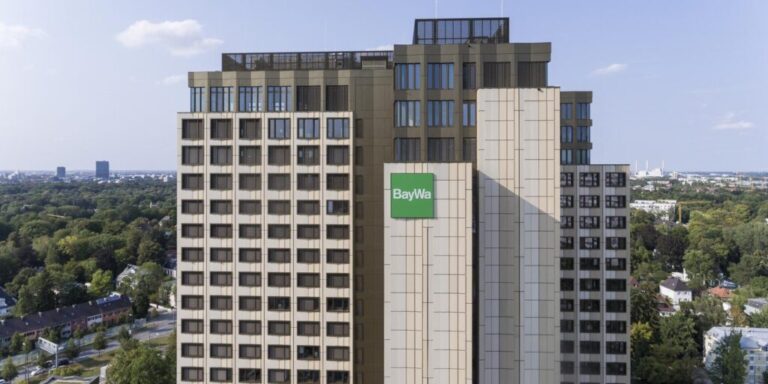The Munich-based group achieved significantly lower turnover in the first half of the year. In addition, it had to make large write-downs, especially on its renewable energy activities.
Unplanned writedowns weighed heavily on Baywa AG’s consolidated half-year results published on Friday. In July, the Munich-based group’s share price more than halved after a restructuring report was ordered, and the company has since recovered only slightly from the slump.
The financial statement shows that Baywa has a turnover of €10.7 billion ($11.97 billion) in the first six months of this year, almost €2 billion less than a year ago. Earnings before interest and taxes (EBIT) before impairment tests amounted to €0.0 million, compared to €186.9 million a year ago. The most recent impairment tests resulted in an impairment loss totaling €222.2 million, Baywa said.
All cash-generating units with their long-term assets had to undergo these impairment tests in recent weeks – a consequence of the market capitalization falling below the book value of equity. Baywa further emphasized that these write-offs had no negative impact on the ongoing restructuring efforts and the implementation of the restructuring concept currently being developed.
However, Baywa still does not dare to make a prediction for the current financial year.
According to the report, the Renewable Energies segment is primarily responsible for the decline in EBIT and a large part of the depreciation. The division’s turnover fell from €3 billion to €1.8 billion on an annual basis. According to Baywa, EBIT amounted to negative €102.8 million, compared to a profit of €98.4 million in the first half of 2023. Value adjustments in the Renewable Energies segment, determined in the impairment tests in accordance with IAS 36, amounted to total €171.5 million. The largest portion, €114.4 million, was attributable to the long-term assets of the IPP business unit, which markets electricity generated by the company’s own wind and PV systems. Significantly lower electricity prices changed the assumptions regarding feed-in to the grid, rising capital costs, occasional changes in the terms of lease contracts and higher financing costs made the adjustments necessary. In addition, depreciation of goodwill and long-term assets took place.
The company has also commissioned a separate restructuring report to combat the crisis and appointed a separate Chief Restructuring Officer. The restructuring report found that the renewable energy subsidiary “is well positioned in its core markets over the long term.” Sales in the PV, wind energy and battery storage projects sector are also expected to pick up in the fourth quarter of 2024. In the past, the majority of sales also occurred at the end of the year.
The results of the other divisions did not differ much from Baywa’s figures for the first half of 2023.
This content is copyrighted and may not be reused. If you would like to collaborate with us and reuse some of our content, please contact: editors@pv-magazine.com.


